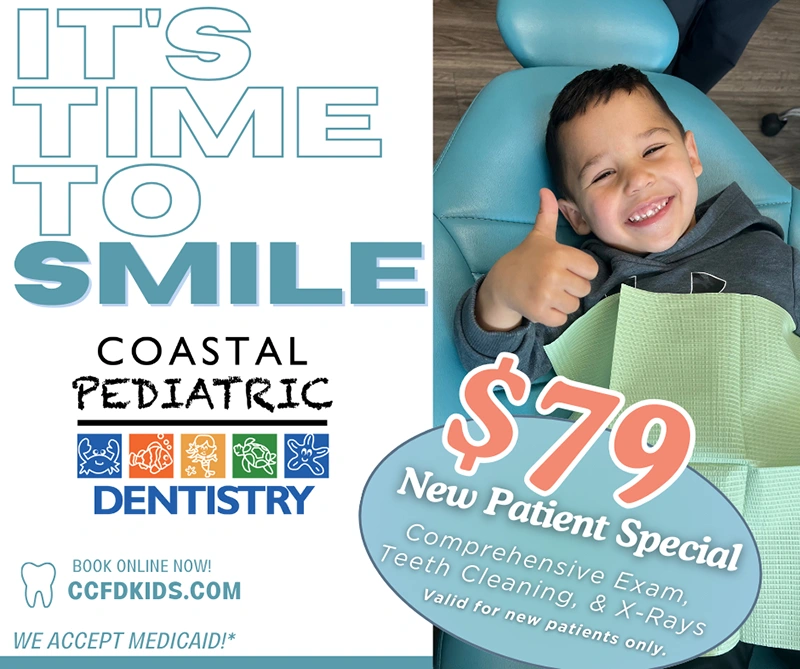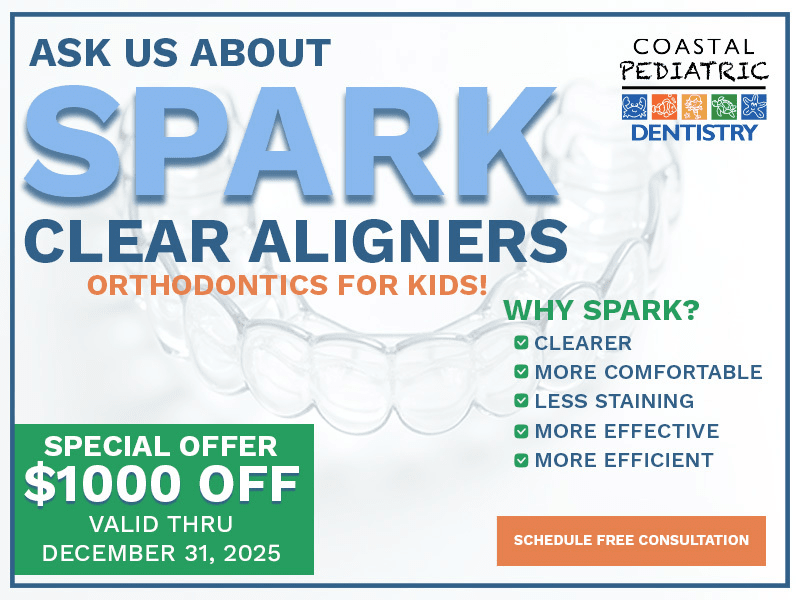What To Do When Your Child Has Their First Cavity
You got your child into the dental office, coaxed them into the chair, and by some miracle even got them to sit still for an x-ray. Right when you are about to pat yourself on the back, Coastal Pediatric Dentistry tells you they found your child’s first cavity.
Bummer.
While you might feel defeated in the moment…don’t, after all, you are in the very best place you could be now! You did everything right and got your child to the dentist for the possibility something would come up. Your child is in the BEST hands with Coastal Pediatric Dentistry.
What to do if your child has their first cavity
-
Don’t panic or become visually upset
Your child will look to you for how to feel about the cavity. Since the 1980’s child development experts have known that children as young as one, look to their parents for social referencing. The Society for Research in Child Development reported that parents’ reactions and behaviors impacted infants’ reactions and behaviors.
How you respond to the diagnosis will impact your child’s feelings. If you want your child to be less fearful; you could respond by saying:
“Gosh, I’m so glad we found it! Can you help us get rid of the cavity?”
Or if you prefer to talk directly to your child, normalize the situation and be reaffirming:
“I remember my first cavity too! Almost everyone gets one some time. It’s good news we found the cavity today so Coastal Pediatric Dentistry can take care of it immediately! No biggie!”
-
Ask questions
Ask as many questions as you like. It can be nerve-wracking to experience something with your child for the first time. Ask Coastal Pediatric Dentistry the following questions to get a better handle on the situation. Make sure if you ask about shots, or drilling (anything that might scare your child) do so without your child present.
- Where is the cavity, can I see it on the x-ray?
- How do you treat cavities like this here?
- Do we take care of it today, or do we need to come back?
- What type of fillings do you place in children?
- Did you see anything else that looked concerning?
- Do you use nitrous sedation with children?
- How long will the filling procedure take?
- How many shots should we expect?
- Will my child be in pain after the procedure?
- How long will the filling last?
- Does my insurance/in-house membership plan cover the filling?
- What can we do to prevent this in the future?
-
Schedule the recommended treatment
Coastal Pediatric Dentistry will probably suggest a filling to stop the decay process and repair the tooth. Sometimes a filling can happen right away, other times you may have to schedule a time to come back. The important thing is to be sure your child is comfortable with the decision. If doing it same day is overwhelming, make the appointment for another time. If the child is ready, taking care of the cavity right away can be more convenient and better for the health of the tooth. Coastal Pediatric Dentistry may discuss the option of dental sealants, fluoride varnish, or other preventive treatments.
-
Be Present if it’s helpful
Depending on your child you may want to sit with them during the filling procedure. Other children do better when their parents are not present. Do what works best for your family. It’s comforting to hold your child’s hand or let them wear headphones and listen to music or watch a show. Talk to your child and encourage them, let them know they are doing a great job.
-
Support long-term health
Finally, give yourself that pat on the back — you deserve it. While your child may have a cavity, you had them in the right place at the right time. Coastal Pediatric Dentistry will provide you with some instructions to help prevent future cavities. Do your best to support your child in making changes if needed. It’s hard to change snack or drink choices; set your child up for success by providing options and encouragement.
If you have questions about your child’s oral health, call Coastal Pediatric Dentistry today!
Disclaimer: “The content of this blog is not intended to be a substitute for professional medical advice, diagnosis, or treatment. Always seek the advice of qualified health providers with questions you may have regarding medical conditions.”
















